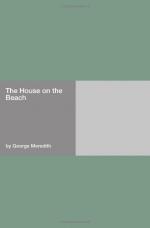The two ladies went in company to Van Diemen, who allowed himself to be melted. He was reserved nevertheless. His reception of Mr. Tinman displeased his daughter. Annette attached the blackest importance to a blow of the fist. In her mind it blazed fiendlike, and the man who forgave it rose a step or two on the sublime. Especially did he do so considering that he had it in his power to dismiss her father and herself from bright beaming England before she had looked on all the cathedrals and churches, the sea-shores and spots named in printed poetry, to say nothing of the nobility.
“Papa, you were not so kind to Mr. Tinman as I could have hoped,” said Annette.
“Mart Tinman has me at his mercy, and he’ll make me know it,” her father returned gloomily. “He may let me off with the Commander-in-chief. He’ll blast my reputation some day, though. I shall be hanging my head in society, through him.”
Van Diemen imitated the disconsolate appearance of a gallows body, in one of those rapid flashes of spontaneous veri-similitude which spring of an inborn horror painting itself on the outside.
“A Deserter!” he moaned.
He succeeded in impressing the terrible nature of the stigma upon Annette’s imagination.
The guest at Elba was busy in adding up the sum of his own impressions, and dividing it by this and that new circumstance; for he was totally in the dark. He was attracted by the mysterious interview of Mrs. Cavely and Annette. Tinman’s calling and departing set him upon new calculations. Annette grew cold and visibly distressed by her consciousness of it.
She endeavoured to account for this variation of mood. “We have been invited to dine at the house on the beach to-morrow. I would not have accepted, but papa . . . we seemed to think it a duty. Of course the invitation extends to you. We fancy you do not greatly enjoy dining there. The table will be laid for you here, if you prefer.”
Herbert preferred to try the skill of Mrs. Crickledon.
Now, for positive penetration the head prepossessed by a suspicion is unmatched; for where there is no daylight; this one at least goes about with a lantern. Herbert begged Mrs. Crickledon to cook a dinner for him, and then to give the right colour to his absence from the table of Mr. Tinman, he started for a winter day’s walk over the downs as sharpening a business as any young fellow, blunt or keen, may undertake; excellent for men of the pen, whether they be creative, and produce, or slaughtering, and review; good, then, for the silly sheep of letters and the butchers. He sat down to Mrs. Crickledon’s table at half-past six. She was, as she had previously informed him, a forty-pound-a-year cook at the period of her courting by Crickledon. That zealous and devoted husband had made his first excursion inland to drop over the downs to the great house, and fetch her away as his bride, on the death of her master, Sir Alfred




